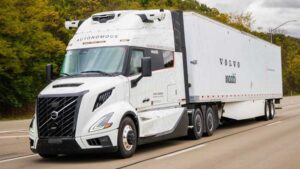For the eighth consecutive month, U.S. sales of new Class 8 trucks topped 20,000 in September, according to data received from Wards Intelligence. Manufacturers reported sales of 22,231 trucks, down 4.8% from sales in August and down 3.2% from September 2022.
For 2023 to date, Class 8 sales of 202,437 have outpaced the 2022 total of 179,422. Sales in 2022 were, however, stronger in the second half of the year. At the mid-point of the year on June 30, 2023, sales were running nearly 21% ahead of the 2022 pace. During the third quarter, sales in 2023 have fallen a little behind the same period in 2022 — and they’re expected to fall further by the end of the year.
ACT Research has lowered its sales expectations for both new Class 8 tractors and trailers, due to the extended recovery time of freight markets.
“Within the broader Class 8 and trailer markets, U.S. Class 8 tractors and van trailers bore the brunt of the markdowns as freight metrics have failed to gain traction,” said Kenny Vieth president and senior analyst at ACT.
The same labor issues that are plaguing the service industry are also impacting the manufacture of new tractors, and builders have had difficulty filling the orders already on the books.
In the meantime, U.S. orders for new, Class 8 trucks shot upward in September to an estimated 36,800 units. While that’s welcome news to manufacturers, much of the increase was simply because of timing. OEMs didn’t start taking orders for 2024 models until August of this year, so many carriers held their orders until those order boards opened up.
CRISIS ON THE HORIZON
There is a crisis looming on the horizon for both truck builders and those who buy them — the expected pre-buy. As the Environmental Protection Agency’s (EPA) Clean Trucks regulation goes live in 2027, truck prices are expected to rise by 12% to 14%. Part of that increase is attributable to longer manufacturer warranties required by the new rules, but like every other year that EPA-mandated regulations have gone into effect, buyers are wary of the reliability of the new technology, in addition to the increased cost. In preparation, they’ll buy extra 2024-2026 models.
The problem is that manufacturers may not be able to meet this increased demand. The same labor issues that are plaguing the service industry are impacting the manufacture of new tractors, and builders have had difficulty filling the orders already on the books.
The recent strike of the automotive industry spread to trucking in September when nearly 4,000 workers at Mack manufacturing facilities in three states walked out in support. Before hitting the picket lines, Mack workers overwhelmingly voted down a contract that offered a 10% wage increase with 19% over the five years of the contract, along with a guarantee that health care premiums would not rise. The union is calling for 40% hourly wage increases over five years, restoration of pension plans instead of 401(k) plans, reduced working hours and more paid time off, among other concessions.
Mack Truck represents about 6.5% of new Class 8 truck sales in the U.S., with many going to the vocational market. If other manufacturers join the strikers, truck production will suffer, and supply chains could eventually be disrupted.
On the used truck market, sales increased by 12% in August over July numbers and 3% over August 2022. Compared with August 2022, the price of the average used truck on the U.S. market fell 26% while both the average age and the average miles fell by 4%. September numbers had not been released at the time of this writing.
As often happens in the used truck market, falling prices are, at least in part, the result of poor freight rates. Existing businesses that need to replace trucks in their fleet can find good used equipment at reasonable prices — but if they finance the purchase, they’ll pay more in interest charges. New entrants to the trucking business may find the reduced equipment prices don’t make up for higher interest rates and low freight rates.
One area that potential truck buyers might have an eye on is the Yellow Freight bankruptcy. The company owned an estimated 12,000 tractors, with a large percentage of them purchased in the past two years. Since most of them are day cabs, hitting the market won’t make much of a dent in the sleeper-equipped over the road segment.
BREAKDOWN OF OEM SALES
The company responsible for liquidating Yellow Freight’s assets has been seeking buyers for the trucks rather than dumping them on the market. Less-than truckload (LTL) carriers are likely to buy these trucks, along with trailers and even terminal locations, to support the business they gained with Yellow’s demise.
Freightliner led all manufacturers with U.S. sales of 7,869 Class 8 trucks, down 3.5% from August and down 6.3% from September 2022 sales. Freightliner accounts for 37.8% of all Class 8 truck sales among major OEMs this year.
Peterbilt is next on the market share list at 14.3% of the market. The company sold 3,458 tractors in September, down just a tenth of a percent (two trucks) from August sales but up 4.2% from September 2022.
Kenworth’s market share is at 14% after sales of 2,998 trucks in September. That number represents a downward slide of 18.7% from a strong month of August and is down 4.7% from September 2022 sales.
Navistar continues to take up market share and reached 14.3% in September, almost even with Peterbilt. Compared with 2022, however, Navistar has gained 1.9% of the market while Peterbilt has lost 0.8%. The company sold 3,202 trucks in September, down 10.7% from August sales and down 16.8% from last September.
Volvo’s 2,393 trucks sold in September was 1.6% lower than August sales but 1.5% ahead of September 2022. Mack gained in both categories with September sales of 1,622 units, up 1.5% from August and 12.6% better than September 2022.
Tiny Western Star sold 691 tractors in September, down 4.3% from August but up a whopping 73.6% from September 2022.
The U.S. Class 8 sales market is still strong — at least for now. Only time will tell what the future holds for the manufacturers of diesel-engine tractors.
Cliff Abbott is an experienced commercial vehicle driver and owner-operator who still holds a CDL in his home state of Alabama. In nearly 40 years in trucking, he’s been an instructor and trainer and has managed safety and recruiting operations for several carriers. Having never lost his love of the road, Cliff has written a book and hundreds of songs and has been writing for The Trucker for more than a decade.















